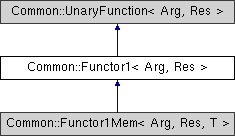#include <func.h>

Public Member Functions | |
| virtual bool | isValid () const =0 |
| virtual Res | operator() (Arg) const =0 |
Additional Inherited Members | |
 Public Types inherited from Common::UnaryFunction< Arg, Res > Public Types inherited from Common::UnaryFunction< Arg, Res > | |
| typedef Arg | ArgumenType |
| typedef Res | ResultType |
Generic functor object for unary function objects.
A typical usage for an unary function object is for executing opcodes in a script interpreter. To achieve that one can create an Common::Array object with 'Functor1<Arg, Res> *' as type. Now after the right engine version has been determined and the opcode table to use is found one could easily add the opcode implementations like this:
Common::Array<Functor1<ScriptState, void> *> opcodeTable; opcodeTable[0] = new Functor1Mem<ScriptState, void, MyEngine_v1>(&myEngine, &MyEngine_v1::o1_foo); opcodeTable[1] = new Functor1Mem<ScriptState, void, MyEngine_v2>(&myEngine, &MyEngine_v2::o2_foo); // unimplemented/unused opcode opcodeTable[2] = 0; etc.
This makes it easy to add member functions of different classes as opcode functions to the function table. Since with the generic Functor1<ScriptState, void> object the only requirement for an function to be used is 'ScriptState' as argument and 'void' as return value.
Now for calling the opcodes one has simple to do: if (opcodeTable[opcodeNum] && opcodeTable[opcodeNum]->isValid()) (*opcodeTable[opcodeNum])(scriptState); else warning("Unimplemented opcode %d", opcodeNum);
If you want to see a real-world example, check the kyra engine. Files: engines/kyra/script.cpp and .h and engines/kyra/script_*.cpp are interesting for that matter.